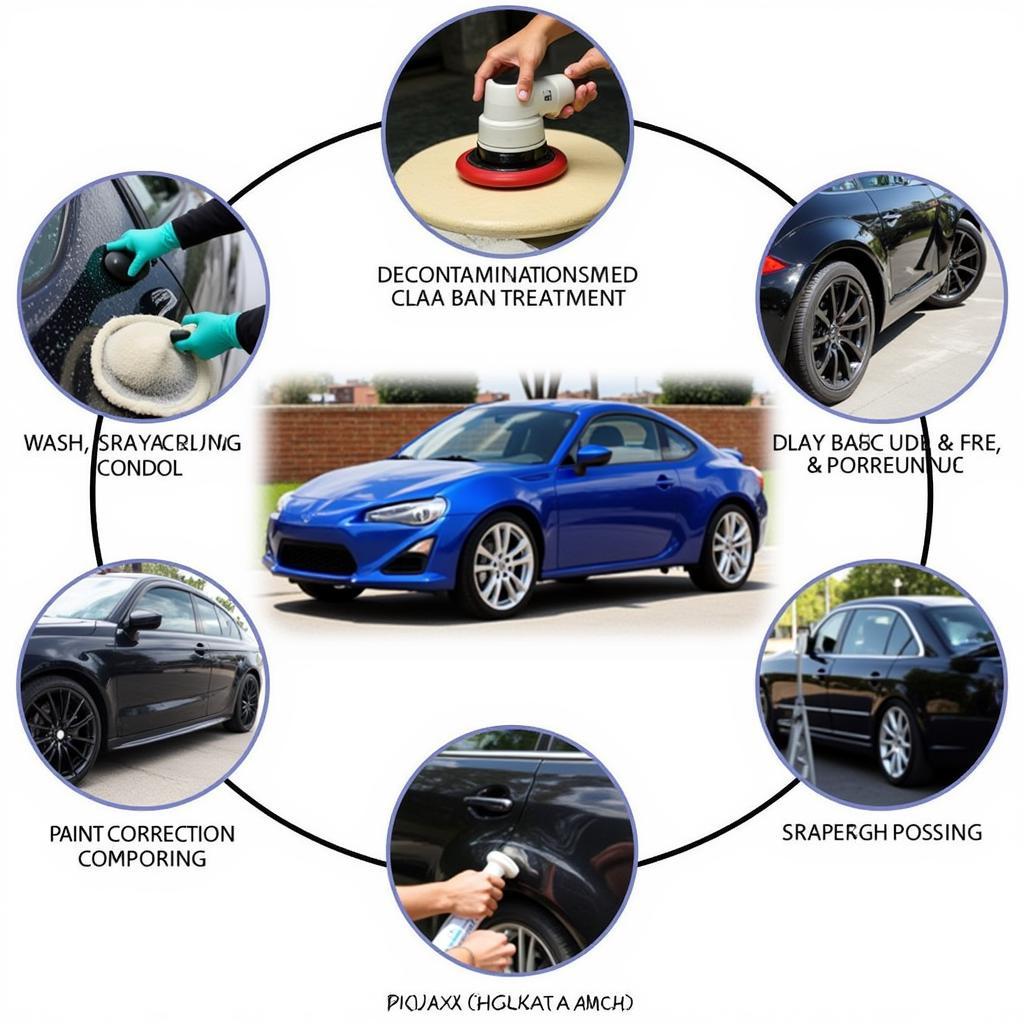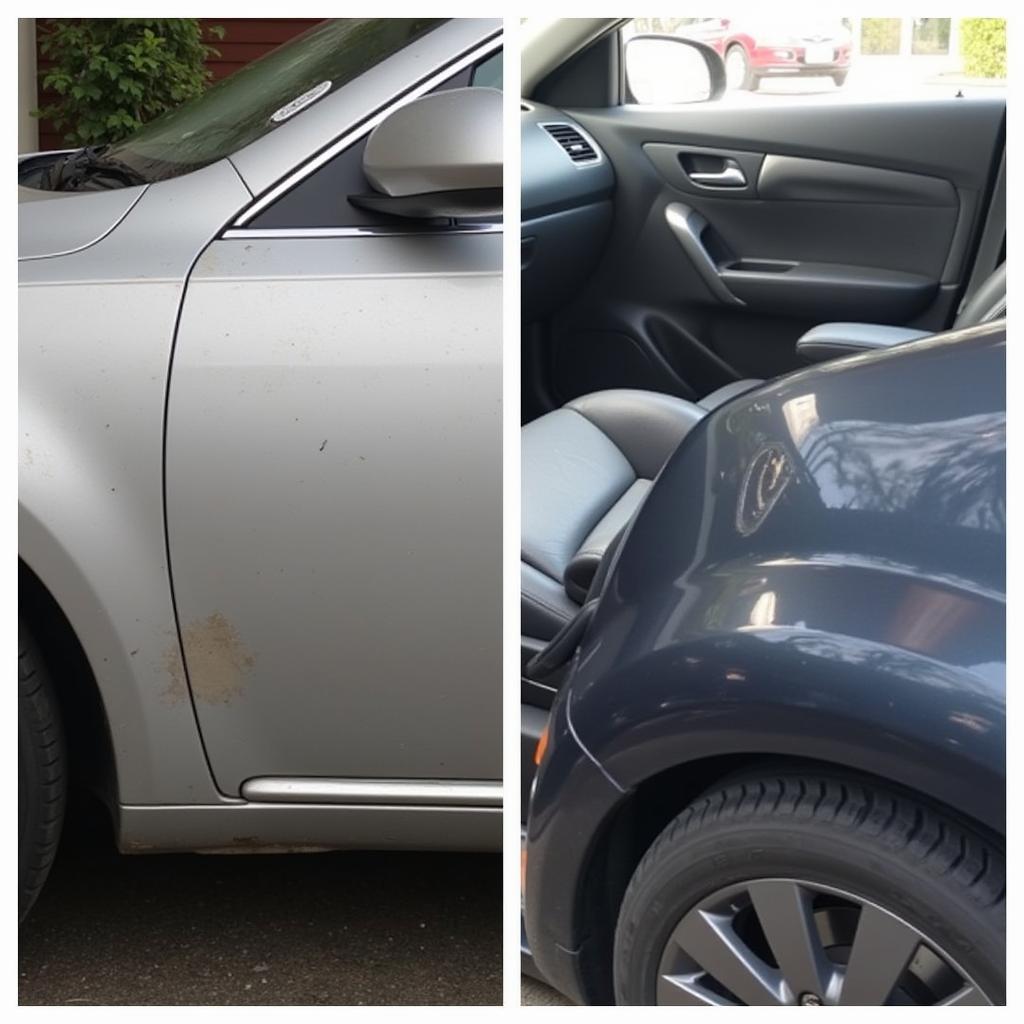Car detailing is much more than a simple car wash. It’s a comprehensive, multi-step process that restores and enhances a vehicle’s appearance, both inside and out, going far beyond a basic clean. It involves meticulous cleaning, restoration, and protection of every surface of the car, from the paintwork to the leather seats, using specialized tools and techniques. But what does detailing a car mean in practical terms, and what does it involve?
Understanding Car Detailing: Beyond a Basic Wash
What separates detailing from a regular car wash is the level of attention to detail and the comprehensive nature of the process. While a car wash aims to remove dirt and grime, detailing goes much deeper. It addresses minor imperfections, restores faded paint, and protects the vehicle from future damage. This involves multiple stages, from cleaning and decontamination to polishing and protecting, resulting in a showroom-worthy finish. Detailing can also significantly improve a vehicle’s resale value, making it a worthwhile investment. It’s about preserving and enhancing the beauty of your vehicle, not just cleaning it.
 Car Detailing Process Stages: From Wash to Protection
Car Detailing Process Stages: From Wash to Protection
The Key Components of Car Detailing
What exactly does detailing a car involve? The process can be broken down into several key stages, each playing a vital role in achieving the desired result:
- Washing and Decontamination: This initial stage removes loose dirt and grime, preparing the surface for deeper cleaning. Decontamination involves using specialized products to remove embedded contaminants like iron particles and tree sap that regular washing can’t eliminate. This often includes the use of a clay bar treatment. For more information on these processes, you can check out what is the meaning of clay detailing in car wash.
- Paint Correction: This is where the true magic of detailing happens. This stage focuses on removing swirls, scratches, and other imperfections from the paintwork, restoring its original gloss and shine. This is typically achieved through polishing and compounding, specialized techniques that require skill and precision. For a better understanding of this process, read what does buffing mean car detail.
- Protection: Once the paint is corrected, it’s essential to protect it from future damage. This usually involves applying a wax or sealant, which creates a protective barrier against UV rays, environmental contaminants, and minor scratches.
- Interior Detailing: Detailing isn’t just about the exterior. The interior receives the same meticulous attention, including thorough cleaning and conditioning of leather seats, carpets, and dashboard, leaving the cabin pristine and fresh. Similar to exterior protection, interior surfaces can be treated with protective coatings.
- Wheel and Tire Detailing: Wheels and tires are often overlooked in a regular car wash. Detailing ensures they receive the attention they deserve, with dedicated cleaning products and techniques to remove brake dust and restore their shine. Dressings are often applied to protect and enhance the appearance of tires. To understand this process better, see what does xleaning and.dressing.mean for car detail.
 Car Detailing: Interior and Exterior Transformation
Car Detailing: Interior and Exterior Transformation
Why is Car Detailing Important?
What are the benefits of detailing your car? Beyond the obvious aesthetic improvements, detailing offers several practical advantages:
- Preservation of Value: Regular detailing helps maintain the car’s condition, significantly contributing to its resale value.
- Protection from the Elements: Protective coatings applied during detailing safeguard the paintwork from harsh weather conditions, UV damage, and environmental contaminants.
- Enhanced Appearance: Detailing brings back the showroom shine, making your car look its best.
- Improved Hygiene: Thorough interior detailing eliminates dust, dirt, and allergens, creating a healthier cabin environment.
What Does Detailing Cars Mean for You?
What does detailing a car mean for the average car owner? It means taking pride in your vehicle and investing in its long-term health and appearance. It means enjoying a cleaner, more comfortable driving experience. Ultimately, it’s about preserving and enhancing the beauty and value of your car.
Conclusion
Detailing a car means much more than just washing it. It’s a thorough and meticulous process that cleans, restores, and protects every surface of the vehicle, both inside and out. From paint correction to interior cleaning and protection, detailing enhances your car’s appearance, preserves its value, and improves your driving experience. So, the next time you’re considering what does detailing a car mean, remember it’s an investment in your vehicle’s long-term health and aesthetic appeal. You can explore more on this topic on what does detailing cars mean and what does detailing a car mean.
FAQ
- How often should I detail my car? Ideally, every 3-6 months, depending on usage and environmental conditions.
- Is car detailing expensive? The cost varies depending on the services included and the detailer’s expertise.
- Can I detail my car myself? Yes, with the right tools and knowledge, but professional detailing often yields superior results.
- What is the difference between waxing and sealant? Wax offers a warmer, deeper shine, while sealant provides longer-lasting protection.
- How long does car detailing take? Depending on the services included, it can take anywhere from a few hours to a full day.
- What is a clay bar treatment? It’s a process that removes embedded contaminants from the paintwork.
- Is car detailing worth it? Absolutely, especially if you value your car’s appearance and resale value.
Need assistance? Contact us via WhatsApp: +1(641)206-8880 or Email: [email protected]. Our customer service team is available 24/7.

Leave a Reply